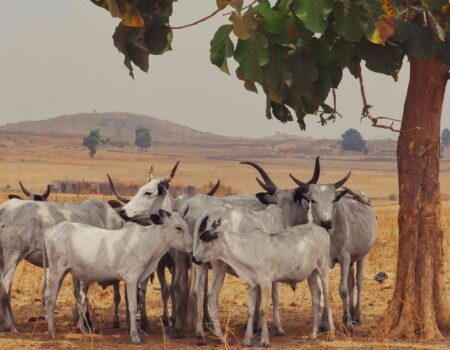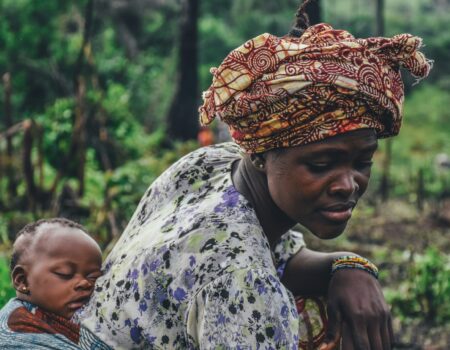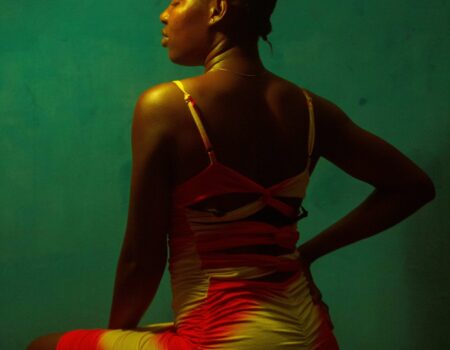Ronda,
I write to you today because the sun may set on me, and I want your tears to know why they run.
Today, guests will fill our house, all the way down to where the compound ends, and Papa will ask me to kill that ram we bought as a lamb last December, and had raised from stranger hand to stranger hand. His voice will be loud, guffawing, his movements spirited—sweeping embraces, expansive gestures that will say more than actual words. He will boast about how he paid Stephen’s school fees all by himself, Biodun’s hospital bills (to which his wife heavily contributed), and Tosin’s project levies—also all by himself. He will talk loudly and repeatedly about how he gave Mama a huge bale of nairas for her mother’s second burial, how he was the one who paid for the different aso ebis that sections of her family wore at the party. On their part, his enemies—uniformed as guests—will sneer into their palm wine cups and whisper spells, curses, all they can to invoke the skies to gush with rain, so that Papa’s celebration will scatter. They will accompany Papa’s laughter with their own scoffing, and point out that the community was thick with rumours of Tosin’s fatherless pregnancy, of Biodun being called an ‘HIV Santa’, and of Stephen being a yahoo boy. They will point out other afflictions and prop them against Papa’s bouncy cheer. They will inform new faces at the party about how Papa’s extravagance is lopsided, because his cook and gatekeeper and even the three drivers complain, behind him, of salary inconsistencies and ill treatment. They will also decry Mama’s haughty relations with her maids, and highlight the persistent divisions among us the children under Papa’s ‘impeccable’ watch. And of course, they will rubbish Papa’s eclectic tastes in furniture and flower selections—the twisted wooden étagère that holds nothing, the magnolias and hibiscuses nudging each other like warring wives. And I will stand by the green Milo van, parked in one side of the compound by the driver of one of Papa’s many factories. I will watch quietly, arms akimbo, perhaps with a little smile, because I am strangely amused and strangely saddened by all that is happening in Papa’s life. And in our lives.
Neither Papa nor his critics will be completely honest about what’s going on here in Papa’s ménage. But I know better. I have cradled the act of speech on the tip of my lips. Of course, Papa will bellow me into silence. Children can’t talk where elders sit. But, as my people say, the farmer’s eye remains swollen, even if both the bee and the wasp deny having anything to do with it. We, the children see; we know. We are the wearers of the shoe; we know where it pinches. The problems that assail us in Papa’s house did not start today; they started like rain, a long time ago, a long, long time ago. And they are still beating us, hard and heavy.
We are a family torn apart, Ronda.
Mama thinks Biodun should not be a part of the family, because Biodun is gay and being gay is not good, it’s in fact the basest of all evils, so Biodun has to be disowned by the entire family. But Papa is having none of that. He says Biodun is still very much part of the household and must stay as such. Mona, he knows what he went through before having Biodun. Mona, his blood runs in Biodun’s veins. Biodun—he says—matters more than his own principles. And so Biodun stays. This is the first crack in our wall, Mama’s boiling loathing for Biodun, Mama’s daily persecution of Biodun.
I feel with Papa. Papa’s wealth boomed when Biodun arrived, a grinning baby, a perfumed bliss. Papa was overjoyed. He had never had it that big since his old master left property in his hands and went back over the seas. You know, Papa used to have a master, a white man like that; his photo still hangs in a frame in Papa’s room. In 1960, the white Oyinbo caught malaria fever and had to go back to his relatives at home, so he left teenage Papa with everything he had taught him, everything he had opened Papa’s eyes to see about investing and profiting. And now, sixty-four years later, Papa’s land had broadened, his assets tripled and, sadly, his liabilities quadrupled.
Our family problems, I repeat, did not start today.
When I was born, thirty years after Papa’s master left, Papa had thrown a party. It was exhilarating to have one’s first child. “A male one, too!”—as I was told Papa had exclaimed in the delivery ward, minutes after I slipped out, wailing. Six years on, while he was looking for his wedding ring, Papa found an old diary in Mama’s wardrobe and accused her of sleeping around. That, therefore, I could not be his son. Mama had been aghast. She had not slept with another man; Papa was the one who deflowered her. So what was he talking about? A bloody war cut through my family. Papa railed for a DNA test. Mama wept. She blamed her sisters for persuading her to marry such a disrespectful man. If not for them, she wouldn’t have touched him even with a 10-foot-long pole. Yes, he was that ugly! For three years, they dragged the issue, incessant fights while I cried at the door, Papa smacking her face, she, clawing back at his with her fixed nails, shouting, “Kill me, useless man. Kill me!” She locked me up in her room, as big as I already was, and refused to let him come near me. People from both sides (her family and Papa’s) rose to intervene. Even people from other families stepped in. Everybody pleaded with her to at least let me out and play with other children on the street. She stood her ground. After those three years, she finally released me for the DNA test. Papa was restive. I remember, faintly, him pacing the tiled floor after the doctor took his blood and mine. I remember the cynical shadow under his eyes as he read the result later. And then the relief that later touched his lips, widening them into teeth. I was his. And he mine. The abomination on my skin was gone. Finally, he could touch me. He could hold me. He did not apologise to Mama, only asked her to burn the diary.
I thought it had ended there, all the noise in one family. But, days to Biodun’s nineteenth birthday, Mama entered his room one quiet afternoon and found him kissing a boy’s lips, both of them—according to her—“locked in an embrace that even the devil would find repulsive”. The beads encircling our peace snapped loose when Papa arrived from work that evening and Mama welcomed him with the news. We assembled in the sitting room, like a small family court. Papa ordered Biodun into the centre and fired questions at him and, to our consternation, he did not deny the truth of what Mama had seen. Papa dismissed the court with a verdict that made me scratch my ear many times to be sure: “Don’t bring your boys under my roof next time.” Mama was flabbergasted. What happened to beating Biodun senseless, dragging him to a full-spirited church and casting the demon out of him? What happened to passing a firm law that forbade him having such perverted relations with humans who had the same thing that he had between his legs? Could Papa not bind him, even if Papa had to make it a crime, punishable, of course, not by death, but then by something very much close to it? She would not have a gay son. Not under her watch.
I was surprised. I was surprised because Biodun was so such more to her than ‘a gay son’. Out of us all, she would find the purest peace with Biodun. Tosin slept with men without collecting money from them; I smoked like Sàngó but did not have his grace; Stephen followed boys who had run away from their homes, boys with dyed hair, boys with nocturnal laptops. Only Biodun had never given Mama the cause to shout herself hoarse. He was the obedient one, the sweet sap, the one who reflected an invigorating academic prowess. Her perfect son. Until now. Watching the veins rise on Mama’s neck, her eyes bulge and redden, her entire frame wracked with tension, I was surprised to see so much hatred in a woman who once fought so fiercely for my dignity as a child. What changed? Why wouldn’t she do the same for another of her children? Or was Biodun’s misbehaviour that monumental, such a big hulking thing, that it compressed all other values a human had and brought into stark singular focus only one thing: ‘gay son’?
Our house wobbles on two potholes: Mama’s questionable uxorial faithfulness and my little brother’s sexuality. These two, like the twin hills in Senegal, have risen so predominantly among all our issues that we don’t even count Tosin’s bastard pregnancy rumours and Stephen’s disheartening fraudster tendencies as problems at all.
Dear Ronda, I know you wrote me to ask about my cousin, Rachel, and that I have not given you any response. But my mind becomes a traffic jam each time I try to talk about it, or pick up a pen to write about it. And my smoke rings become cloudier. Mama’s family don’t talk about that girl. I often ask myself why Mama is more taken by Biodun’s non-disruptive desires than by Rachel’s precarious fate. Ten years now, and my cousin is still at the enemy’s camp, in their thick forest. Her stomach will have swelled many times with the seeds of those who speak in guns and explosives. I have written reams of letters to the police, to human rights’ magazines, to newspapers, to the government, to embassies. I have walked barefoot into churches where their women gyrated and spoke gibberish. I have let chemicals darken my organs, because I want all the things I cannot be and do to heave out of me and escape into air. But it won’t stop Papa and Mama from celebrating. It won’t stop today’s party.
Ronda. I am already imagining how today will unfold, even as I write in bed, the walls breathing around me, the house still quiet, the dawn still unwrapping itself from God’s hand. It’s all I can do, this writing, to stop myself from slipping another stick of nicotine into my mouth. Save me, Ronda. You know what people turn this to, especially when they believe you deserve an illness just because of “what you choose to do”. When I sleep, it’s nightmares that wake me up. I watch my brother’s eyes to see if the Santa rumours are true of him, if our maladies as a family just hardened, if Papa has finally lost his voice against Mama. But Biodun has slipped his voice into empty brackets and sealed it all with lines I can’t break, because I can’t read them.
Ronda, will my brother have to walk this path alone?
It must not be.
You must be tired of my family issues, Ronda. We are not the only family around. Look at our neighbours to the south. They went through greater hell. They were poorer, had strings of children. They didn’t have so much land, so much fertile land, that Papa had. In 1994, they were even poisoning each other (please don’t let me go into gory details). But look at them today; things are different for them. They have a beautiful sense of “let’s stick up for one another as a family”. When I place this next to the insidious apathy in my family, it makes me want to cry.
Cry, Ronda, cry for my family.
I’m sorry, but that’s all you can really do to help me. Papa and Mama are too busy with their own shattered illusions to focus on the well-being of us their children. Laughter escapes me when they speak to their friends of the future they are building for us. A family with neglected children cannot expect to have atoday, much less a future. We had a uniform childhood, all four of us, waking up to find absent parents, or present parents who were trapped in other concerns: work, money, fashion, society, newspapers. We looked after ourselves by ourselves, making friends that our parents did not know, roaming strange streets, picking up new routines. We left for school each morning but we barely went to school. Only Biodun did. Even Stephen to whom Papa gave the most scholarship, did not attend his classes up to three times a week. Biodun who went came back kissing his teeth one day, because his English Language teacher, a graduate of English Language, kept mixing her tenses and saying “more better” and “borrow him your pen”. He would go on to tell us, after supper, while we were taking turns to have our bedtime bath, how most of his classmates had started talking about petty robbery and Internet scamming. Sometimes, today, when I watch him talk about his classmates, his eyes turning red, I wonder if he is close to tears only because of the value degeneration rolling through schools, or because he is terrified that he will soon fall into a crisis, his own crisis, perhaps a bigger, more disastrous one, a wicked fate he may not be able to trammel. Perhaps he also fears what the rest of us fear: that we will never be free of Papa and Mama’s failures.
My doctor has told me that I have cancer of the lungs. I think that’s the only thing left to tell you.
I long for you, Ronda.
I miss the moments I thought would stay forever. So much.
I don’t believe in your God, but remind Her of me. If She’s truly a good mother, unlike one I know, I will be here with the energy to write you more letters.
Greet the runners of East Africa. And please fall in love with one of them. You know they make running into freedom seem so easy, so painfully, beautifully easy.
I remain yours,
Boripe.
Enit’ayanfe Ayosojumi Akinsanya
Enit'ayanfe Ayosojumi Akinsanya is a Yorùbá Nigerian writer. He grew up in Sagamu, in southwest Yorùbáland. He was born in 1994. He has fetched some awards for writing, like the 2022 Itanile Prose Award and the 2023 Sevhage-Agema-Founder's Prize for Short Fiction. He is the author of a short-story collection, How to Catch a Story That Doesn't Exist. He believes that stories are ways of speaking to and listening to the world. He reads poetry, watches deeply human films, and tweets at @OsumareAyomi.





